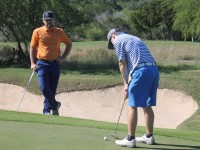Written By: Greg Cartin | @GC3Greg
Performance enhancement and human potential are topics that have appealed to me since I was an athlete in high school. Team sports like soccer and lacrosse came easy (as far as my thinking was concerned), and while I had worked hard to develop technical skill in golf, it seemed more often than not that my mind would get in the way of my performance. Being an individual sport, one in which we initiated the action and did not react to teammates and opponents, and where we had so much time alone with our thinking, all added to the challenge.
The difference between team sports and golf fascinated me, and it was then that I set out on a journey to better understand the mental game of golf, and why it seemed to differ from other athletic endeavors.
My first introduction to the study of sport psychology and performance enhancement was during high school and came in the form of a book by Dr. Bob Rotella called “Golf is Not a Game of Perfect”. It was a fascinating introduction for me and provided many real life examples and simple-to-use techniques to help us all “think” better on the course. It provided instant improvement but after a few weeks I had noticed that I slipped back into the same bad habits. The quest continued.
At the time I was reading Rotella’s book, I was also introduced at school to some eastern philosophy teachings, more specifically Zen Buddhism. I read “Zen and the Art of Motorcycle Maintenance”, a classic book that took eastern philosophy and applied it to western culture. Something clicked. I started to realize that becoming immersed in the process and sharpening moment to moment awareness, while also finding ways to quiet the mind, could translate into enhanced performance. Little did I know at the time, but these early readings were crucial in shaping my beliefs on human potential, and that this would lead to a career later in life.
Check out the Nextgengolf Job Board
And now 20 years later, after completing my doctoral work in counseling psychology and logging many practicum hours I now engage in a private practice where I mesh both eastern and western philosophies to help golfers and all athletes better understand their thoughts and how they may affect performance. It is not a simple process, but my goal with my clients is to simplify it so that it is not just an intellectual exercise, and that through an enhanced understanding of the nature of thought, we can slowly learn to get out of our own way when performing.
Currently my clients span Tour professionals to high handicap amateurs. I believe that while we are all unique in how we process information, we all share a similar bond. Human beings have evolved to seek comfort and to avoid discomfort at all costs. When fear and anxiety strike, our instinctual response is to flee, freeze, or fight, all of which can create great obstacles in a sport like golf. Learning how to create more space between thought and action can be a huge benefit when it comes to performing at our best.
We don’t have to run or tense up when we experience discomfort, or “negative thinking”. No longer do we need to be tethered to our thinking! It is never the actual thought that causes us stress, but our attempt to control, change, or stop our thinking. A simple awareness of this subtle truth can often be just enough to provide us with more freedom when we compete!
